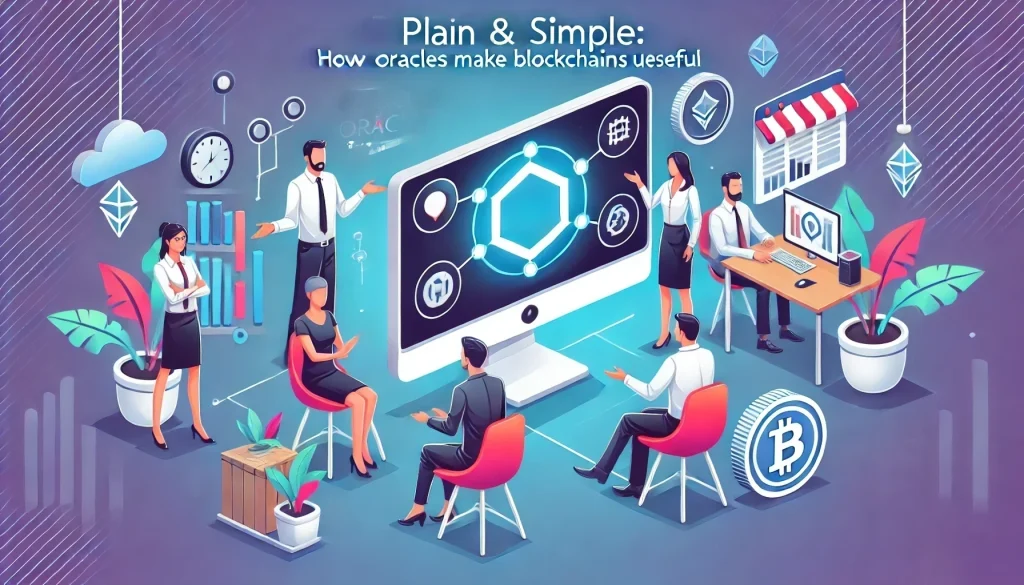
Plain and Simple: How Oracles Make Blockchains Useful
Remember when we were kids and played with Magic 8-Balls? You would ask them a yes or no question, shake them, and an answer would mysteriously float up to the little window. The answers were super vague like “Ask again later” or “Outlook good.” We thought they were magic and could predict the future! Of course, as we grew up we learned Magic 8-Balls were just simple toys with prewritten answers on liquid-filled dice. But what if we could create a real “magic 8-ball” that gives reliable answers to any question by connecting blockchains to real-world data? Enter blockchain oracles.
We’ve all heard about blockchains – the technology behind Bitcoin and other cryptocurrencies. They allow digital information to be distributed without being copied or tampered with. But here’s the thing…blockchains can only access data within their own network. They have no way to directly connect with external data called “off-chain” data (like weather reports, sports scores, news, etc.) So how can we build useful blockchain apps if they can’t access real-world data? Would you use a weather app that couldn’t access weather data? An investment app with no stock prices?
Here comes the oracle – our magic 8-ball! Oracles are services that provide a bridge between off-chain data and blockchain networks. They connect blockchains to anything outside their own network like weather sensors, sports score APIs, stock ticker data, news sources, even random number generators. Now blockchains can use reliable real-world data to execute smart contracts instead of just managing internal digital ledgers.
Let’s look at some real examples. Say we want to create a blockchain app that tracks airline flight delays and pays out cryptocurrency to customers if flights are delayed over 2 hours (yay free money!). The blockchain would need to access real-time flight status data from external airline databases. An oracle connects them so when a major delay happens, the blockchain auto-executes a smart contract to deposit funds to customer wallets. Or say we have a crop insurance blockchain app that pays farmers if rainfall goes below a drought threshold. It would connect to weather station data oracles to monitor rainfall in different regions and payout claims automatically based on smart contract conditions.
These are just a couple basic examples, but oracles open up tons of possibilities. They are the key to creating useful real-world decentralized apps across finance, insurance, supply chain tracking, gambling, gaming, etc. Even linking blockchains to sensor data like GPS can enable next generation “smart property” applications. Without oracles, blockchains might as well be Magic 8 Balls giving randomized nonsense answers.
But this brings up an important question – if blockchains are supposed to be decentralized and trustless, is bringing in 3rd party data safe? Can we trust the oracles ourselves?
Good question young grasshopper! Oracle reliability is crucial for secure properly functioning blockchain applications. Centralized oracles provided by a single company introduce risk (what if they go down!?). They also undermine decentralization by becoming a single point of failure.
Luckily, developers are building decentralized oracle networks to solve these issues. These distribute data access across multiple independent nodes called “oracle nodes” similar to peer nodes on blockchain networks. Leading examples include Chainlink and API3. I won’t get too deep into the technical details here, but they use clever cryptographic techniques to ensure data reliability. For example, requiring consensus from several nodes before data gets relayed to smart contracts.
Decentralized oracles also allow oracle networks to be governed by stakers/nodes instead of a centralized entity. Users can even run their own oracle nodes, verifying data sources themselves to earn crypto rewards if their reports match consensus! This maintains decentralization and aligns incentives structures correctly imho. Pretty cool innovation!
So in summary, oracles provide critical real-world connectivity for blockchains to execute useful applications with smart contracts. Decentralized oracle networks are emerging to enable this while maintaining security assurances and decentralization true to blockchain’s core values. Just like Magic 8 balls, they seem to magically allow blockchains to answer any real-world question reliably. The difference is the tech actually works! 😉
So next time someone claims blockchains have no real-world purpose, bring up oracles to show how they bridge on-chain and off-chain worlds. We’re just getting started exploring creative ways smart contracts can automate real-world processes with reliable data. Even though the tech sounds complex, the possibilities to disrupt traditional industries are endless! I can’t wait to see what innovative developers build next leveraging oracles. Who knows, maybe one day they actually WILL be able to predict the future accurately. But for now they efficiently execute conditions in the present – and that itself leads to a more transparent and honest world!